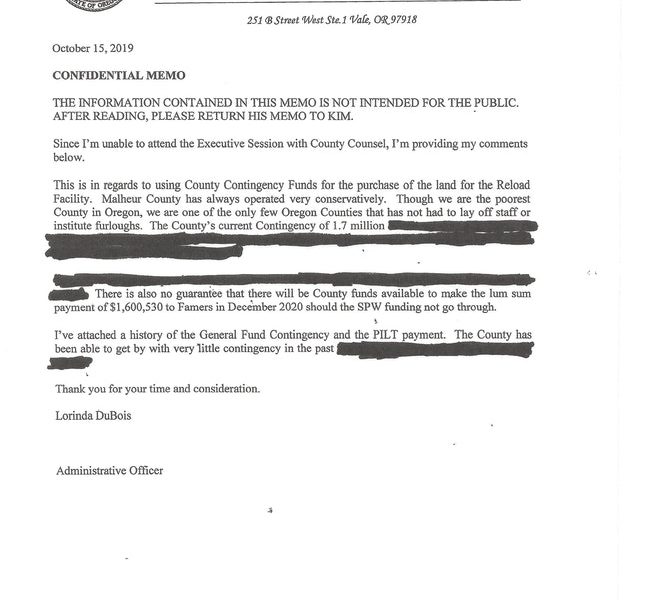 Lorinda DuBois, Malheur County chief administrative officer, released this memo with portions redacted to protect “frank” communications with other public officials. The Enterprise has petitioned to have the redactions removed.
Lorinda DuBois, Malheur County chief administrative officer, released this memo with portions redacted to protect “frank” communications with other public officials. The Enterprise has petitioned to have the redactions removed.
Documents released by state agencies served as the foundation for our report published Dec. 10 about Malheur County’s efforts to buy and pay for Nyssa farmland.
When Malheur County officials decided in October they would borrow money to keep their industrial project dreams alive, the Enterprise sought out details.
The newspaper wanted to explain why the money was needed and how the county intended to pay back the loan.
Reporter Pat Caldwell on Nov. 1 sent detailed questions and to Greg Smith, the private contractor paid to run the county’s Economic Development Department, and more questions on Nov. 7 to Smith and to Dan Joyce, the Malheur County judge. The questions attempted to get information about where the county would get the money for loan payments.
Joyce and Smith didn’t respond. When Caldwell later approached the judge at the courthouse about the questions, Joyce responded: “No comment.” When Caldwell approached Smith, he was told to file public records requests to get any information.
The Enterprise subsequently obtained key documents from Business Oregon, the state economic development agency that has agreed to lend money to Malheur County. The agency readily provided the county’s loan application, the agency’s staff report and a land appraisal.
The newspaper sought the appraisal, finished Oct. 31, from Joyce through a public records request. His office responded on Dec. 3 that he didn’t have it.
When the appraisal provided by the state showed a significantly lower value for the Nyssa land than county officials were obligated to pay, the Enterprise sent written questions about the matter to Joyce and County Commissioners Don Hodge and Larry Wilson. They didn’t respond by deadline Monday.
The Enterprise also sought records from Lorinda DuBois, the county’s chief administrative officer. She promptly released redacted versions of two internal memos she had written in recent months, both addressing the notion of using county money for the land. She didn’t respond to a subsequent interview request.
As part of its usual practice and because of the complexity of the land deal, the Enterprise on Sunday, Dec. 8, sent draft excerpts of its story to the three county commissioners and Smith. They were each asked to identify any factual errors. The commissioners didn’t respond, and Smith wrote back only that there were “multiple, multiple errors” but didn’t identify any error or provide correcting information.
This system of providing excerpts is extraordinary – few news organizations in the country go to this extent. The Enterprise does so to take every possible step to ensure we report accurately and fairly. Public officials who see what they think is an error in advance of publication and then stay silent aren’t serving the public.
Readers can find links to the key documents we used in our online version of the story you can find HERE.
Here are links to key email exchanges in recent weeks with the county officials, showing the questions asked by the newspaper and the opportunity they had ahead of publication to ensure accuracy.
DOCUMENT: Questions to Greg Smith – Nov. 1
DOCUMENT: Questions to Greg Smith – Nov. 7
DOCUMENT: Questions to Dan Joyce – Nov. 7
DOCUMENT: Email to Dan Joyce seeking fact checks – Nov. 18
DOCUMENT: Email to Greg Smith seeking fact checks – Nov. 18
DOCUMENT: Questions to Greg Smith, his response – Dec. 5
DOCUMENT: Questions to Dan Joyce – Dec. 6
DOCUMENT: Email to Greg Smith for fact check, his response
DOCUMENT: Email to Dan Joyce for fact review
If you have questions about this project or our reporting, you can reach Publisher Les Zaitz directly at [email protected].




